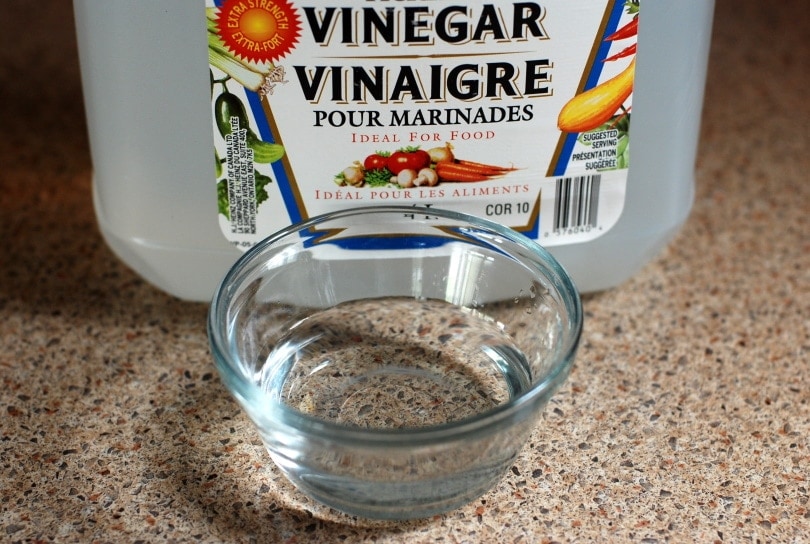Can Dogs Have Vinegar? Our Vet Explains Health Risks & Benefits

Updated on

Vinegar is safe for dogs if it is given in moderation. It has a few benefits for your dog, but it can lead to stomach upset if you give them too much. Organic, unpasteurized, unfiltered apple cider vinegar is best.
In this article, you will find out how much vinegar dogs can consume and its benefits for canines.
Vinegar Is Safe for Dogs in Moderation
Dogs can have apple cider vinegar, distilled white vinegar, or even better, unpasteurized and unfiltered apple cider vinegar, but only in moderation. You can add a spoonful of vinegar to your dog’s water bowl every day or over their food, though be aware that they may not like the pungent smell and taste.
Even if vinegar is considered safe for dogs, remember that some dogs are more sensitive and may be allergic or intolerant to it. Clinical signs of vinegar intolerance in dogs include:
- Vomiting
- Diarrhea
- Flatulence
- Bloating
In allergic reactions, clinical signs like difficulty breathing and/or swelling of the face and throat may also occur. For these reasons, it is recommended to give a tiny amount of vinegar to your dog for the first time to see how they react and if they develop any reactions.
Furthermore, if you give your dog too much vinegar, they can develop gastrointestinal disorders. It’s always recommended to contact the vet when you want to introduce new foods to your dog’s diet.

The 4 Benefits of Vinegar for Dogs
While dogs can safely consume distilled white vinegar, apple cider vinegar is best and has countless benefits for canines, both internally and externally.
1. It Improves Dogs’ Digestion
Dogs that consume a grain-based diet can have digestion problems because the pH in their digestive system is out of balance. To lower the pH and stimulate the cultures of good bacteria in your dog’s stomach, you can give them vinegar.
Sprinkle apple cider vinegar over a few raw vegetable leaves. Leave them in the fridge to ferment, then mix a teaspoon of those vegetables into your pet’s food. Your pet will benefit from the nutrients from the vegetables, and their digestion will be stimulated by apple cider vinegar. You can add a spoonful of vinegar to their drinking water or directly over their food.
Keep in mind that too much vinegar can cause gastrointestinal upset. Moreover, many dogs do not react well to diluted vinegar.
2. It Helps With Hot Spots and Skin Itchiness
Apple cider vinegar, especially the organic version, can be used to treat hot spots and skin itchiness. Organic apple cider vinegar is a cloudy liquid, full of proteins, enzymes, and friendly bacteria.
To help your dog with itching or hot spots, mix vinegar and water in equal parts and spray on the affected areas, or soak cotton balls in the solution and apply on those areas.
Also, if your dog has generalized itching, you can bathe them with special shampoo and rinse with diluted apple cider vinegar (50/50 dilution). In addition, apple cider vinegar will make your dog’s fur soft and shiny.
Too much vinegar on your dog’s skin can lead to dryness or irritation.

3. It Can Clean Your Dog’s Ears
Ear infections in dogs are common, especially among breeds with long ears, because these do not ventilate properly and keep moisture trapped inside, which favors the multiplication of bacteria.
To clean your dog’s ears with apple cider vinegar, prepare a solution of vinegar and water in equal amounts. Soak a makeup remover pad in this solution, and wipe the ear flaps and the portions of the ears that you can reach without shoving the pad around.
The vinegar rebalances the pH of the ears and kills fungi and bacteria.
4. It Can Keep Insects at Bay
Apple cider vinegar does not kill fleas but can repel them because they do not like its smell or taste. So, you can spray a mixture of vinegar and water on your pet’s fur before taking them out for a walk. Use one part water and one part vinegar to prepare the mixture.
If your dog doesn’t like it when you use a sprayer, use a brush. Soak the brush in the mixture, and then comb your dog all over their body.
Remember that it is still possible to find fleas on your dog even if you apply this solution. What’s recommended is to use veterinary antiparasitic products because they are the most effective against fleas, ticks, and other insects. It is vital for your dog to be flea or tick free because these pests can transmit deadly diseases.

Frequently Asked Questions (FAQ)
Can My Dog Have Balsamic Vinegar?
It is best not to give balsamic vinegar to them. Balsamic vinegar can be toxic to dogs because it is made from grapes, and grapes are toxic to dogs. If large quantities of grapes are consumed, it can lead to sudden kidney failure. If your dog becomes intoxicated with balsamic vinegar, you may notice the following clinical signs: vomiting, diarrhea, hypersalivation, loss of appetite, abdominal pain, and lethargy. Consult your veterinarian if you suspect that your dog has consumed large amounts of balsamic vinegar or grapes.
Can My Dog Eat Vinegar-Flavored Chips?
It is not the best idea. Chips contain a lot of salt and oil/fat, plus other potentially toxic ingredients like pepper, onion, or garlic, as these can harm your dog. It is recommended to only give healthy treats to your dog, such as carrots, apples, or green beans, and save the chips for yourself.
Conclusion
Vinegar is safe for dogs and can be used both internally and externally; apple cider vinegar is the best type. Make sure you always use it in moderation, though, because it can do more harm than good. The most common benefits that apple cider vinegar has for dogs are improving digestion, cleaning the ears, keeping insects at bay, promoting healthy fur, and helping with hot spots and itching. You can add a spoonful of vinegar to your dog’s water daily or over their food.
For external use, mix equal parts apple cider vinegar and water, and use a spray bottle to spray the solution on your dog’s body and fur. Too much apple cider vinegar can lead to gastrointestinal problems or dry and/or irritated skin. It is best to talk to your vet before giving apple cider vinegar to your dog, especially if they have kidney problems.
Featured Image Credit: In Our Steps, Shutterstock














